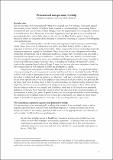Files in this item
Personal and non-personal worship
Item metadata
| dc.contributor.author | Cockayne, Joshua | |
| dc.date.accessioned | 2020-04-02T16:30:03Z | |
| dc.date.available | 2020-04-02T16:30:03Z | |
| dc.date.issued | 2020-03-26 | |
| dc.identifier | 266625358 | |
| dc.identifier | 5156eb51-060f-46e5-8c09-3f5ff3165671 | |
| dc.identifier | 000522171400001 | |
| dc.identifier | 85086110916 | |
| dc.identifier.citation | Cockayne , J 2020 , ' Personal and non-personal worship ' , European Journal for Philosophy of Religion , vol. 12 , no. 1 , pp. 1-20 . https://doi.org/10.24204/ejpr.v12i1.2711 | en |
| dc.identifier.issn | 1689-8311 | |
| dc.identifier.other | ORCID: /0000-0002-1545-8247/work/71560014 | |
| dc.identifier.uri | https://hdl.handle.net/10023/19749 | |
| dc.description.abstract | Is it possible to worship a non-personal God? According to some, the answer is no: worship necessarily involves addressing the object of one’s worship. Since non-personal gods cannot acknowledge or respond to address, it must be conceptually inappropriate to worship such gods. I object to this argument on two fronts. First, I show that the concept of worship used is too narrow, excluding many cases that obviously count as instances of worship. And, secondly, drawing on recent work on the philosophy of object knowledge, I argue that addressing non-personal gods might not be as conceptually confused as it first appears. Thus, it at least possible to worship a non-personal God. | |
| dc.format.extent | 255269 | |
| dc.language.iso | eng | |
| dc.relation.ispartof | European Journal for Philosophy of Religion | en |
| dc.subject | Worship | en |
| dc.subject | Pantheism | en |
| dc.subject | Personal | en |
| dc.subject | Non-personal | en |
| dc.subject | BL Religion | en |
| dc.subject | T-NDAS | en |
| dc.subject.lcc | BL | en |
| dc.title | Personal and non-personal worship | en |
| dc.type | Journal article | en |
| dc.contributor.institution | University of St Andrews. School of Divinity | en |
| dc.identifier.doi | 10.24204/ejpr.v12i1.2711 | |
| dc.description.status | Peer reviewed | en |
| dc.date.embargoedUntil | 2020-03-26 |
This item appears in the following Collection(s)
Items in the St Andrews Research Repository are protected by copyright, with all rights reserved, unless otherwise indicated.

